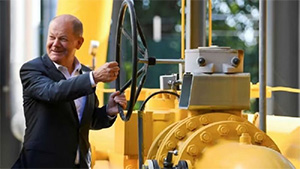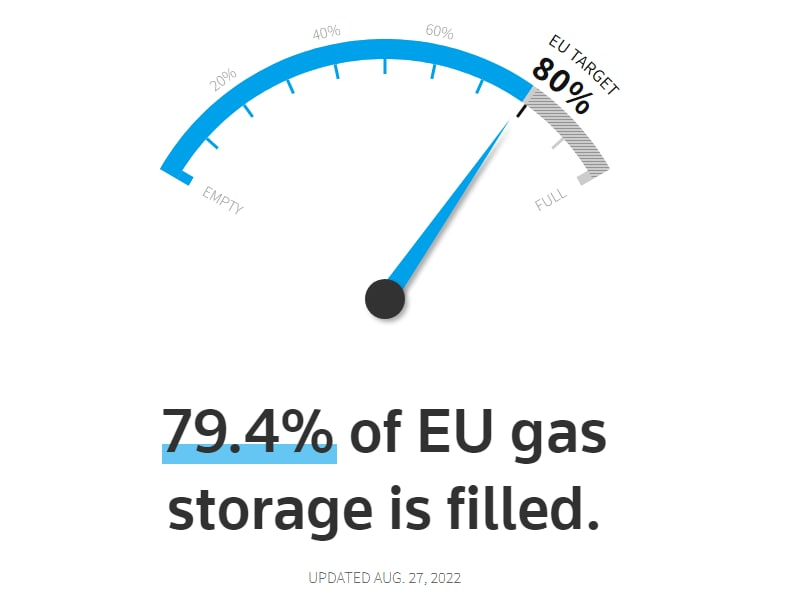Europe at the Crossroads of Hunger and Freezing
The global inflation crisis, resulting from the rising costs of energy and other essentials of civic life, has engulfed many countries. Even though there are promising and acceptable signs of inflation rate reduction in some countries, especially the USA, this slight reduction in inflation does not mean that prices are decreasing.
It simply means that the growth of prices is slowing down, and the increase in costs continues at a slower pace. The significant rise in the prices of goods and services is largely due to the increase in energy prices following Putin’s aggression and occupation crisis in Ukraine. Russia has placed its foot on the neck of the global livelihood and continues to apply pressure. Europe sees itself on the frontline of the battle with Putin, and behind the scenes of the Russian-European confrontation, citizens of various countries on the continent are thinking about winter amid unprecedented heatwaves.
Price Growth, Energy Companies Getting Rich, and the Price Cap Crisis
Price increases naturally delighted oil and gas company executives the most. Windfall profits recorded by companies like Shell, Centrica, and Total have registered unprecedented revenue and net profit figures. Total made headlines in France by tripling its profits, breaking records, and surpassing forecasts.
The Norwegian company Equinor, in one instance before the end of July, paid an additional $3 billion to shareholders. The price increases, alongside continuous news of European energy companies’ profitability, united EU officials to impose special taxes on these companies, and a serious proposal was registered in the European Parliament at the end of June.
In the UK, the story took a different turn. The political crisis resulting from Boris Johnson’s scandals and mishaps, which led to his resignation, left behind a temporary and weak government. The election race to choose Boris’s successor became entangled with discussions about price hikes and the skyrocketing costs of winter heating.
The two final candidates also fueled concerns with their differing policies on how to combat these price increases. There is almost no hope for citizens that whichever of the two final candidates becomes Prime Minister will keep the energy price cap steady or fully compensate the growth through direct payments to the people. The UK has never been as reliant on energy exports from Russia as countries like Germany, and whatever Russian imports existed reached zero in June. Continuous news of living concerns for the winter shakes the British not day by day, but hour by hour.
Battle with the Russians, Gas Saving, and Price Cap
The European Union designed a comprehensive and special program for energy price saving and initially announced its implementation as voluntary so that different countries could execute it according to their preferences and conditions. Mandatory implementation of the saving plan does not have a serious outlook. Nevertheless, the saving plans of countries like Germany have been astonishing.
Implementing policies to cap and floor the heating levels of public places and officially setting the desired temperature on one hand, and reducing the lighting hours of public places and streets at night on the other, have been part of this policy. The heartbeat of European countries dependent on Russian imports fluctuates with every rise and fall in the gas flow in the pipelines, and in the meantime, the subtleties and nuances in supporting Ukrainians must be observed so that Putin does not get angry and cut off the gas altogether.
The good news for Germans is that their government has succeeded in storing gas and reached the desired level ahead of schedule. Most, but not all, European countries are interconnected in energy networks, and the European Union, to strengthen its position against Putin and eliminate the strategic weakness risk, enacted an official law to mandate gas storage and make storage facilities strategic.
Countries like Germany have taken serious steps in successfully implementing this plan. In any case, complete gas storage does not remedy the price increase. The livelihood outlook for the people of Europe is bleak and gloomy. Something must be done about the price growth.
Naturally, implementing a policy to keep prices stable under current conditions means that the difference must be paid by governments to energy companies in various ways. Even if tax increases are for the wealthy and large companies, they will ultimately lead to price increases in different sectors in the medium and long term.
The British Labour Party, amid the Conservative Party’s electoral chaos to determine Boris Johnson’s successor, published alarming reports and studies about the British winter livelihood, proposing an energy price stabilization plan, the costs of which would be met in various ways.
Interestingly, no conservative politician explicitly mentions imposing a serious and special tax on energy companies, and their maximum cooperation is with limited tax increases on British energy giants. Overall, even the Labour Party leader’s plan was described by many as dreamy, and some criticized the imposition of costs on the public budget, pointing out that the wealthy do not need help and there is no reason for their energy costs to remain fixed.
We must wait for the new government with a new Prime Minister in the UK to see their policies regarding the crisis. Boris Johnson spent recent weeks on a recreational leave in Greece. Recent studies indicate that, at best, if they do not consider a price cap, 25% of the British population will never turn on their home heating in the winter of 2023, faced with the dilemma of food costs versus heating costs.
The European Union’s program to combat energy prices has entered a new phase. The Czech Republic, as the rotating president, has issued a call for an emergency meeting of energy ministers from member countries. In Brussels, the Belgian energy minister has urged all EU member countries to swiftly design and announce an emergency and executable plan to stabilize the energy price cap in these countries.
The Belgian minister has warned that the time for promises and talk is over, and the moments for immediate action have arrived. He predicted that without setting a price cap, Europeans face tough winters in the next five or even ten years. Many in Europe, especially in the UK, will be caught in the dilemma of heating their homes or feeding themselves if no policy is devised.


